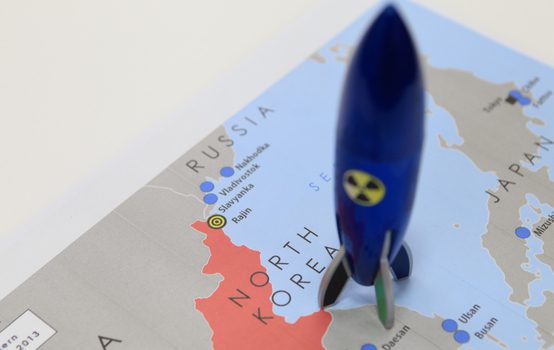Can Trump Handle North Korea?

There is growing concern in the White House and Pentagon that North Korea will soon have the capacity to strike the west coast of the United States with nuclear weapons. Earlier this month, it test-fired four solid-fuel Scud-ER ballistic missiles, indicating that Pyongyang soon will have that ability. In response, the United States deployed a Terminal High Altitude Area Defense System, THAAD, to provide South Korea and ultimately Japan with a shield to protect them. But there are several major problems with this response.
First, the North Koreans have deployed mobile missile carriers that compromise the ability to carry out a preemptive strike, which would destroy them before they leave the ground. What’s more, THAAD is not fool-proof and it cannot destroy the ICBMs that North Korea will someday deploy. And there is more bad news: according to the New York Times, North Korea’s “speed-up testing seems intended to send a message that they can overwhelm antimissile defenses, deploying missiles faster than the United States and its allies can put countermeasures in place.”
Second, the Chinese claim that THAAD is designed to neutralize their nuclear deterrent, and they refuse to accept American pronouncements that it does not have that capability. China has warned the Americans, and South Koreans will pay a price for deploying THAAD. Toward that end, China has taken economic measures to punish the latter but as yet has not taken actions against the United States. Chinese Foreign Minister Wang Yi has observed that the Americans and North Koreans are playing with fire: “The two sides are like two accelerating trains coming toward each other with neither side willing to give way.” Equally disturbing, the dispute has enormous implications for U.S.-China relations that give rise to a possible clash between both countries. The prospect that Washington will redeploy nuclear weapons in South Korea makes Chinese defense analysts nervous. The situation clearly demands prudent leadership in the White House, but that has not been visible since Donald Trump’s inauguration. He has embarked upon a course riven by unsubstantiated claims and intemperate personal attacks on critics, foreign and domestic.
Third, the last South Korean president, Park Geun-Hye, was impeached for corrupt practices. Park’s more moderate successor is expected to covet a less contentious relationship with North Korea than the daughter of a former dictator. The same holds true for ordinary Koreans who know that Seoul is within striking distance of Pyongyang’s massive artillery system, which has the capacity to destroy the capitol. Rather than confront Kim Jong-un, the South Koreans may embrace the status quo and compel Washington to confront a dodgy young man who frequently engages in risky behavior, or reconcile with him. In Tokyo last week, Secretary of State Rex Tillerson said a new approach to the North Korean threat must be crafted, but he did not make specific recommendations.
This situation demands American leadership that is measured and capable of coordinating a diplomatic and possible military response to this existential threat to peace on the Korean Peninsula. Success will require adroit coordination between the State and Defense departments; trust between the White House and the intelligence community; a commander-in-chief who has displayed a profound understanding of the global political system along with the capacity to earn the trust of our European and Asian allies. But President Trump and his national-security team have not demonstrated the ability to meet any of these imperatives, and instead have displayed clashes between people who entertain conspiratorial fantasies and others who are governed by reason and first-hand knowledge of world affairs. It is most troublesome that Secretary of State Rex Tillerson has been denied access to visiting world leaders while the president’s son-in-law, Jared Kushner, has that privilege.
President Trump has promised that the deployment of North Korean ICBMs will never happen—presumably, he is contemplating a military response. His UN ambassador, Nikki Haley, has indicated that all options are on the table and there is growing concern that this time it may be difficult to avoid a military clash. National-security advisers like Tom Donilon and Steve Hadley, who served Obama and George W. Bush, recently told CNN’s Fareed Zakaria that past efforts to halt North Korea’s quest for nuclear weapons have failed; these have included economic sanctions, economic rewards, and pleas for China’s help. Neither man has been able to provide an exit from a potentially horrific showdown. Therefore, facing the deployment of ICBMs under the control of the flaky Kim Jong-un has encouraged some in the White House and the Pentagon to consider a military clash with North Korea—one that would produce significant casualties on both sides.
Given President Trump’s propensity to oppose and then support many critical foreign-policy initiatives—such as opposition to and then support for NATO—and to launch intemperate attacks on the U.S. intelligence community and long-time allies, many seasoned foreign-policy analysts representing a range of views have real concerns about his capacity to serve as an effective and prudent commander-in-chief. It is not surprising, therefore, that two prominent psychiatrists have alluded to Trump’s “mental instability.” In a letter to the New York Times they observe, “In particular, we are struck by his repeated failure to distinguish between reality and fantasy and his outbursts of rage when his fantasies are contradicted.” Trump’s surreal behavior condones doubts about his capacity to deal with complicated threats such as North Korea, particularly when so much depends on discerning what is fiction—and what is reality.
Dick Krickus is a distinguished professor emeritus at the University of Mary Washington and had held the H.L. Oppenheimer Chair of Warfighting Strategy at the U.S. Marine Corps University. His forthcoming book is America’s Tragic Crusade in the Middle East.
Comments